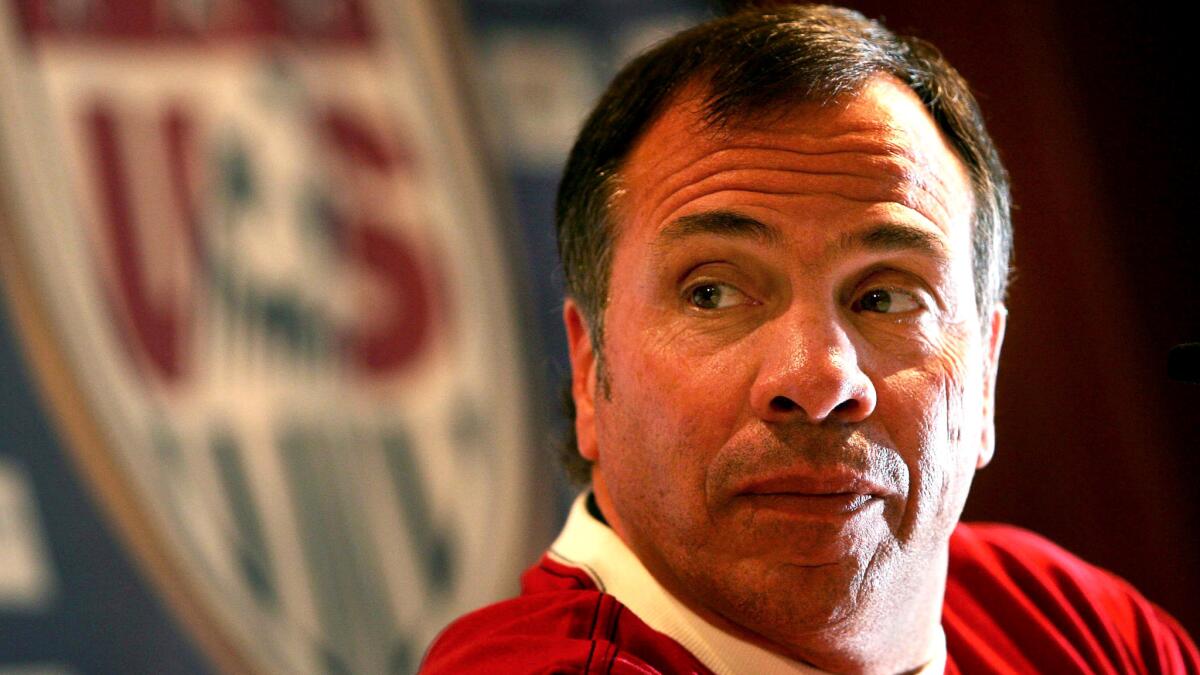Bruce Arena embraces challenge of national team job

Each morning, Bruce Arena makes the same 15-minute drive from Manhattan Beach to StubHub Center that he has made for the last eight years. He parks in the same lot, walks the same hallways and sits behind a desk in a new office nearly identical to the old one, which is only 10 paces away.
Yet, for all the similarities, the job Arena begins in earnest this week is far different from the one he left last month. At 65, an age when most people are winding down their careers, Arena is stepping his up, leaving the comfort and accomplishment of the Galaxy to try to rescue a struggling U.S. national soccer team.
“I enjoy the change. I really do,” Arena said. “It’s something that I need to do. It’s a good challenge.”
In fact, it may be the greatest challenge Arena has faced in a Hall of Fame coaching career in which he has won five NCAA championships, five MLS titles and a record 71 games in his first stay with the national team between 1998 and 2006, when he became the only man to coach the U.S. in two World Cups.
On Tuesday, when he opens his first national team training camp in more than a decade, Arena will take over a team that is winless and in last place in the six-team CONCACAF standings two games into the final round of World Cup qualifying. And with the 10-game hexagonal tournament resuming in March, he has precious little time to right the ship.
“It would be an absolute failure if this team did not qualify for the World Cup,” said Stuart Holden, a former national team midfielder who is a soccer analyst with Fox. “There’s still a long way to go. That can all change pretty quickly.
“[But] March is going to be a telling point.”
The 32-man team Arena has invited to StubHub Center will bear little resemblance to the one he’ll assemble for the spring qualifiers with Honduras and Panama. Since there is no FIFA international break this month, Arena was unable to summon players from Europe or Mexico, limiting his selections to those on MLS clubs.
But Holden said the month-long camp will be less about rebuilding the roster then about rebuilding the team’s mentality, which had waned under former coach Jurgen Klinsmann.
“The team was not necessarily believing in themselves or themselves as a group,” said Holden, who played in the 2010 World Cup. “They didn’t seem to be on the same page as Jurgen Klinsmann.
“It’s just a matter of reinstilling that confidence and that belief and getting this team playing with some structure and an idea of what they need to be doing out on the field.”
Arena gave other not-so-subtle hints that there will be larger breaks with the approach Klinsmann followed. His roster, for example, includes midfielders Benny Feilhaber and Darlington Nagbe, both of whom had strained relationships with the former coach. He also summoned former national team players Chad Marshall and Dax McCarty, who Klinsmann never called up.
And Arena ditched the elaborate, and unpopular, fitness and diet regime Klinsmann installed
“I haven’t spent a whole lot of time trying to analyze the Jurgen Era,” Arena said. “Jurgen did a lot of good things for U.S. Soccer. [But] we’re all different. We have different approaches to things and that will probably be obvious to the players.”
On the field, however, Arena faces the same issues his predecessor did: a shortage of depth at right back and left back, the lack of a playmaking midfielder and the need for an alternative to aging goalkeepers Tim Howard and Brad Guzan.
An inability to solve those problems was one of the things that cost Klinsmann his job. If Arena is also unable to find a solution, the damage could be far greater.
The U.S. is one of seven nations, alongside Argentina, Brazil, Germany, Italy, Spain and South Korea, that have qualified for the last seven World Cups. To keep that streak alive, the team will have to finish in the top three of the CONCACAF tournament, meaning it probably needs 15 points from its final eight qualifiers, giving it little margin for error.
“We’ve got to dig ourselves out of a little bit of a hole,” said Arena, who followed a difficult qualifying campaign for the 2002 tournament by leading the U.S. to the World Cup quarterfinals in South Korea, the best finish by an American team in the modern era. “So we’ve got to do things the right way and have this program prepared for March.”
In some ways, Arena can’t lose. If he rescues the team and qualifies for the 2018 tournament, he’ll add to an already unparalleled legacy. If he comes up short, blame will fall on the slow start under Klinsmann. But the coach said a recent trip to Las Vegas taught him the fallacy of that theory.
On the first night, Arena enjoyed a long winning streak at the blackjack table, so when he came back the next day he was essentially playing with house money, all of which he lost, sending him home empty-handed. The lesson? No one cares how a competition starts but no one forgets how it ends.
“I can’t be that comfortable just playing with house money. I’ve got to realize that I can lose it all,” Arena said. “There are no excuses for not qualifying.”
Twitter: @kbaxter11







